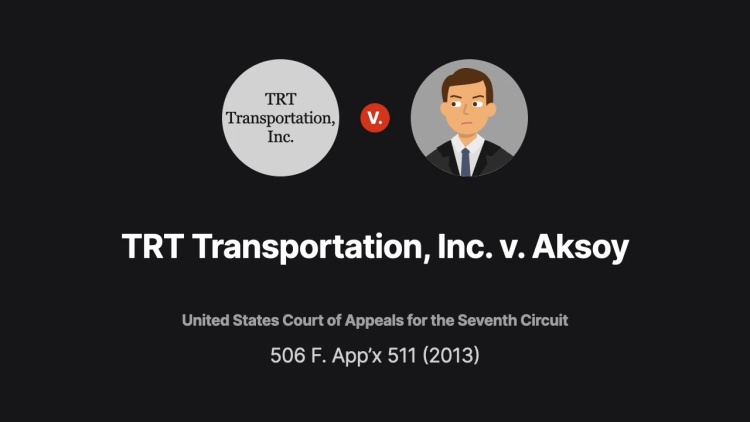TRT Transportation, Inc. v. Aksoy
United States Court of Appeals for the Seventh Circuit
506 F. App’x 511 (2013)
- Written by Abby Roughton, JD
Facts
TRT Transportation, Inc. (TRT) (plaintiff) operated a fleet of sightseeing trolleys under the trademarked name Chicago Trolley Company. TRT brought a trademark-infringement action against Yildirim Aksoy and Chicago Trolley Rentals, Inc. (collectively, Aksoy) (defendants) in federal district court. TRT asserted that Aksoy offered substantially similar trolley services under the name Chicago Trolley Rentals and that Aksoy’s trolleys copied the distinctive colors and patterns of TRT’s trolleys. TRT and Aksoy participated in a settlement conference with a federal magistrate judge in January 2012. During the conference, the parties orally agreed on the record that Aksoy would be enjoined from using the phrase “Chicago Trolley Rentals” and the words “Chicago” and “trolley” immediately adjacent to each other or in any other form that would be confusingly similar to TRT’s Chicago Trolley trademark. When TRT’s lawyer suggested that the terms would be subject to further negotiation in connection with a formal written settlement agreement and injunction, the magistrate judge sought confirmation that the injunction would include the agreed-upon terms and that the terms would be enforceable. TRT and Aksoy verbally confirmed the judge’s understanding. Following the conference, TRT and Aksoy began drafting a written settlement agreement but could not agree on Aksoy’s proposed use of the phrase “trolley rentals in Chicago.” Aksoy sought relief from the district court, asserting that the parties did not yet have an enforceable settlement agreement. The court disagreed and found that the parties had entered into an enforceable agreement during the settlement conference. The court enjoined Aksoy from using the phrase “Chicago Trolley Rentals” and using the words “Chicago” and “trolley” adjacently or in any other manner that was confusingly similar to TRT’s trademark. Aksoy appealed, asserting that the parties had not reached an enforceable agreement during the settlement conference. Aksoy claimed that the oral agreement’s terms were too vague to be enforceable and that the parties had not specifically mentioned the phrase “trolley rentals in Chicago.”
Rule of Law
Issue
Holding and Reasoning ()
What to do next…
Here's why 911,000 law students have relied on our case briefs:
- Written by law professors and practitioners, not other law students. 47,100 briefs, keyed to 997 casebooks. Top-notch customer support.
- The right amount of information, includes the facts, issues, rule of law, holding and reasoning, and any concurrences and dissents.
- Access in your classes, works on your mobile and tablet. Massive library of related video lessons and high quality multiple-choice questions.
- Easy to use, uniform format for every case brief. Written in plain English, not in legalese. Our briefs summarize and simplify; they don’t just repeat the court’s language.





